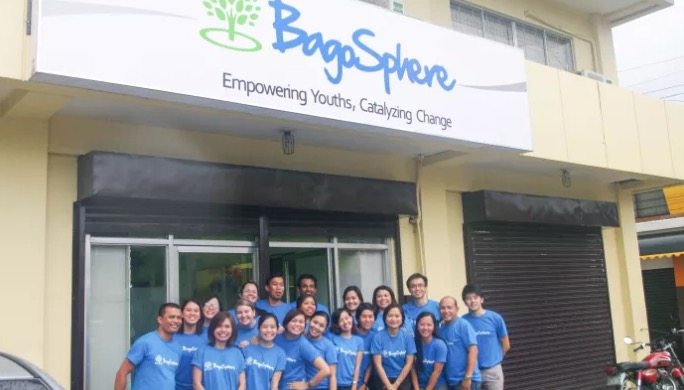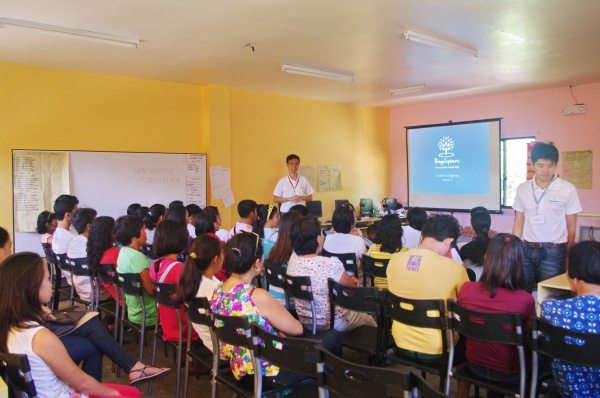Evolution, not revolution, is key to innovating the education space

I’ve always had a fascination with social enterprise. While most entrepreneurs would consider profiting and philanthropy to be separate activities altogether, social entrepreneurs consider giving and taking as two sides of the same coin. Thus, social enterprises act to both help those in need, while simultaneously profiting from these endeavours.
In emerging economies like the Philippines, social enterprises seek to uplift individuals and communities from their otherwise difficult or even destitute states.
Some focus more on altruism; helping beneficiaries with their essentials and daily needs. Others focus on empowerment — helping beneficiaries help themselves. Singapore-registered (but locally operating) Bagosphere is the latter.
Backed by Kickstart Ventures, Bagosphere essentially runs its training programme for aspiring BPO(Business Process Outsourcing)workers, and has partnered with non-profit foundations, educators, and BPO companies to give participants a better chance at success in the call centre industry.
The industry is considered to be a key contributor to growth and development in the Philippines.
I first got to know Bagosphere when I interviewed Co-founder and CEO Zhihan Lee as part of a feature on the Nikkei Asian Review. Back then, the company already had some success with its training programme for marginalised, but industrious, youth.
Also Read: It’s more fun: 500 Startups reportedly to enter Philippines in 2017
The company also received funding from Swiss-based elea Foundation for Ethics in Globalization in late 2015. I met Lee again this week to catch-up, and it seems the social enterprise is still going on, but needed to evolve along the way.

Microcredit as a form of student loan
Education is not cheap, says Lee, over a cup (okay, two cups) of coffee. He says that while government-run initiatives like TESDA provide free vocational training for interested individuals via local government units, the trouble is ensuring the quality of such training, the qualifications of the graduates, and the longer-term impact of these scholarships.
This is what differentiates Bagosphere’s programme. The startup focuses on long-term engagement with its trainees — helping them with placements and employment opportunities, and ensuring they truly benefit from the learning.
In addition, Bagosphere’s training is not purely funded by scholarship. Rather, the programme is partly financed by donor funding as well as microfinancing. Graduates pay a certain portion of their monthly salaries upon getting hired, to pay back the loan portion to Bagosphere.
And this is where the company earns its profits — through the interest charged on top of principal payments.
The perspective of ownership
One key concept in empowering aspiring BPO professionals through microfinance is ownership.
“Since the training programme is not a dole-out like purely free scholarships, trainees have a higher sense of ownership over their learning and the entire activity,” said Lee. “They know that training will make a difference to their [earning potential], but they are also aware that they are paying for their own education.”
This is also the same case with the funding provider. Since there is a for-profit component, the lenders — and Bagosphere itself — are incentivised to see through the success of the programme’s participants.
After all, graduates will not be able to pay on time (or at all) if they do not find meaningful employment. With a pure dole-out, it is just the pure numbers that will matter (such as the number of graduates that finish the programme, regardless of whether they actually apply the skills in meaningful employment, or not).
This is where the company has found some challenges.
Previously, Bagosphere financed the microcredit portion through crowdfunding, and then managed the loan portfolio by itself.
“It was challenging and expensive to have to hire credit employees to go door-to-door to collect payments,” said Lee. “Now, we are partnering with microfinance providers for the loan portion of our programme.”
The company has also allotted part of its money to a guarantee fund, which covers any defaults.
“The individual stories are different — some fall ill, some simply don’t want to continue working at call centres, while others still experience extreme financial or family difficulties that prevent them from paying up.”
However, Lee says the default rate for microfinance in Bagosphere’s experience is quite low at only 3 per cent.
On why edutech is not always the answer
Considering that Bagosphere is essentially an education startup, I asked Lee what he thought about the new applications, platforms and learning-oriented material coming out as part of educational tech, or edutech.
“I don’t believe that apps and devices will be the best solution to education challenges, especially in countries like the Philippines,” he said. “While apps and devices like smartphones can help improve access to content and educational material, we have to stress the importance of teachers and mentors. We also have to stress the importance of continuous training and education for teachers.”
“Instead, a more personalised and targeted approach to education will have a more far-reaching impact.”
Here is where Lee believes the Philippines’ education system can learn a thing or two from programmes like France’s INSEAD education system.
For Bagosphere the strategy would help evolve learning in the Philippines and move the system away from the boilerplate, centralised curriculum to a more personalised approach aimed at engagement and practicality.
“In partnership with established higher-ed institutions in the country, we are trying to promote a highly-targeted pedagogy, wherein students get to choose their own programs, and accomplish these at their own pace,” said Lee. The key advantage here, he says, is that students and graduates get to learn across-the-board skills, and not just a specific skillset meant for a specific job type or industry.
“In the past, highly-specialised skills were considered important in the work environment,” he told me. “Today, however, professionals need to have skills in various fields, in order to be effective in their work. The lines between blue collar, white collar and top-level work have been blurred.”
Also Read: 5 Filipino startups that showcase a different Philippines
He cites an example of technology, robotics, and automation enabling nurses to do part of a surgeon’s work, whereas years ago, these professionals’ work would be compartmentalised.
He also cites the need for everyone to at least learn business and accounting skills. “These are important in any industry, especially for people looking to start up their own businesses.”
Entrepreneurs need to innovate
Lee shared an observation that while the Filipino culture is rich with entrepreneurship, there is a need for business-minded people to be more innovative.
“When you go to the provinces or even to the cities, there are all these carinderyas (food stalls or canteens), but they mostly offer the same thing,” he said. “I’d like to see entrepreneurs be more innovative and unique in their offerings.”
On this note, I also shared the same observation about sari-sari stores (or small corner stores), which essentially sell the same things — snacks, candies, cigarettes, soft drinks, laundry soap, etc. Lee agreed:
“Entrepreneurs can compete better if they can innovate.”
On a parting note, Lee stressed that education is one industry that cannot simply be disrupted through technology and applications.
“It’s not about revolution. Rather, it’s about evolution.”
—-
Featured Image Copyright: rawpixel / 123RF Stock Photo
Other Images: Bagosphere
The post There’s no app for that: For this learning startup, the solution to effective education goes beyond apps appeared first on e27.